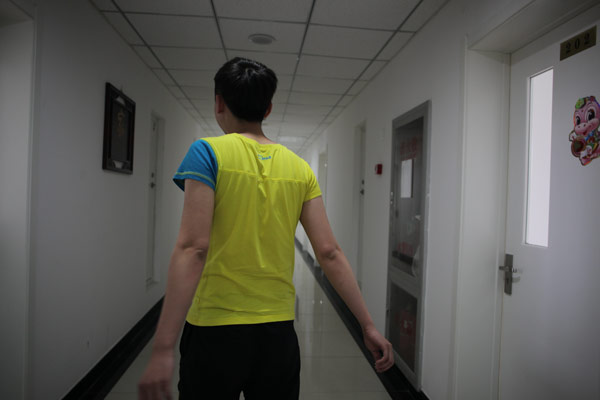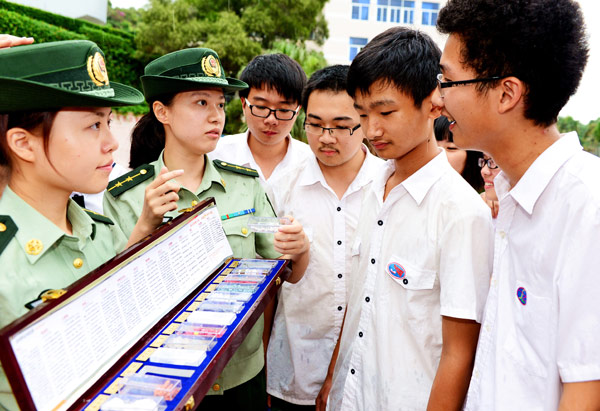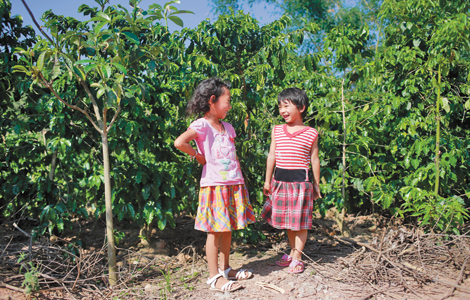Recovery gives youth new chance at life
Updated: 2013-06-24 07:09
By Zhang Yuchen and Wang Shanshan (China Daily)
|
|||||||||||
 |
|
Hu Xiaojia, 21, on the last day of his three-month stay in Beijing Drug Rehabilitation Center. He began to use drugs at age 14. WANG JING / CHINA DAILY |
Drug use a rising issue among the young, report Zhang Yuchen and Wang Shanshan in Beijing.
Although it was the last day of his three-month recovery program at a drug rehabilitation center, Hu Xiaojia didn't expect a farewell party. He knew no one would be waiting to greet him on the outside and help him reintegrate into society.
Sitting at a square table, still drowsy from his noon nap, Hu is one of the 1,000 voluntary recovering addicts at the center.
"I waited all morning for you to arrive, preparing a complete version of my story, but I fell asleep because you turned up later than I expected and it was noon," he said, looking like a naughty teenager smiling in the sunshine.
At 21, he is the youngest patient at the Beijing Drug Rehabilitation Center, and he doesn't feel like looking back at his "bloody and tearful" teenage years. In fact, he'd rather forget about his past life entirely.
The problem started at a heroin party with friends at a dance hall in Shanxi province when he was 14, but perhaps his addiction could have been foreseen. When he was young, Hu's parents separated and married new partners, both of whom were strangers to him.
"Why did I begin to use the drug? Well, my parents said I was a bad child," he said. His voice became toneless and his smile was replaced with a slightly resentful and cold look. "I believed their comments, which, as I have recently realized, triggered my low self-esteem."
Addicts before adulthood
|
Reporter's log by Zhang Yuchen Tragic stories, tragic lives It was not a good feeling to be among drug users. Although most appeared as normal as any healthy person, after a few minutes I found that something inside had been lost. The reasons for taking narcotics are varied: fun, a lack of parental love, pursuit of "fashion", low self-esteem, boredom and high levels of disposable income. Maybe deep down, all human beings share the same feelings of weakness and powerlessness, especially when faced with temptations they can't resist on their own and choices they can't help making. Once addicted, only they can make the decision to clean up, but making the correct decision at the right time is tricky. A trainer at the rehabilitation center told me she has heard many tragic stories about the dark side of human nature. Her own experience of drug addicts has also given her great empathy for the people she helps. A 26-year-old addict told me how he finally decided to stop using drugs. After selling his father's car and losing his own job as a driver, the young man had squandered about 300,000 yuan ($49,000) on drugs since 2008. Although he was still able to live a relatively normal life, he lost many friends and his reputation plummeted. It was only when his closest friends gave him a final warning, that he realized the most significant thing in his life was the love and devotion of his family and the few friends who had stood by him. Similar stories have been told many times and with various outcomes - some good, some bad. Rather than marveling at a happy ending though, resolving not to enter into such a lifestyle is much more worthwhile. |
Living alternately one week with his mother's new family and the other with his father's, and with plenty of money at his disposal - too much money for a boy with no real parental guidance - Hu's story is similar to those of other addicts. The same spiral of drug abuse dominates; at the beginning they use drugs for fun or to win approval from their peers. At first, they use drugs once every two or three months, but the frequency rises to once a month, then once a week. Finally, when the situation escalates and gets out of control, they use drugs every day.
Hu can't clearly remember how his "friends idling in the street" persuaded him to take the first hit of heroin, but he is adamant that he would never encourage friends or classmates to use drugs.
Eventually a friend informed on him and Hu was arrested. Before that, he'd managed to hide his new "hobby" from his parents, and even the increasingly large amounts of money he requested did not alert them to the situation.
The cycle of arrest and release at local police stations became routine, and although he continued to use a number of drugs, mostly heroin, he never took crystal meth, a highly addictive derivative of amphetamine, which is popular with younger drug users.
"The situation is becoming worse in that an increasing number of young users have started taking new types of drugs," said Sun Benliang, director of the Beijing rehabilitation center. "More young people are becoming addicted".
Last year, about a dozen 14-year-old middle school students were found to be using various narcotics in the Miyun district of Beijing.
Drug use is rising in China; the country had 1.79 million registered addicts at the end of 2011, according to the United Nation's Office on Drugs and Crime. In 1990, the number was 70,000. Moreover, the actual number of addicts is believed to be much higher than the official figures suggest, with some estimates putting the number at more than 12 million.
Never use 'ice'
One incident shocked Hu to his core and made him reassess his priorities. At a bachelor party, he saw how the groom-to-be began to hallucinate after taking "ice", as crystal meth is sometimes known. Believing he was being chased by the police, the young man jumped from a seventh-story window and died, just one day before his wedding.
Hu said he will never forget the terrified look on the man's face as he ran through the room. At that point, he made a decision - never use "ice".
Although, it's unlikely to be the last tough decision Hu will have to make in connection with drugs, it was a wise one. In 2011, 65 percent of Chinese addicts were heroin users, a decline of 13 percent since 2008. By contrast, users of methamphetamine, the official name for crystal meth, accounted for 23 percent of addicts, up from 9 percent in 2008, according to the UN.
A few years ago, Hu's mother was diagnosed with a brain tumor that almost sent her blind. His mother's illness shocked Hu, so he decided to tell her the truth about his addiction and attempted to stop using drugs.
However, his mother seemed not to understand the damage heroin was doing to her son, until one day she discovered him crawling on the ground, face down. Without drugs, Hu was going through "cold turkey", the aches and pains, burning fevers and icy coldness that accompany total heroin withdrawal.
But it wasn't his mother's tears that prompted him to quit, so much as her subsequent actions. She gave him 100 yuan and said, "Don't torture yourself like that. If you're suffering that much, go and take some drugs to feel better."
Hu took the money, but instead of buying heroin, he bought methadone, a prescription substitute. He had made his decision. However, he didn't realize how hard quitting would be.
He tried to quit twice before he finally decided to admit himself for the three-month course. The first time he tried quitting, around a year ago, Hu only stayed at the center for one day. He couldn't stand the idea of seven days of compulsory treatment and without his loved ones around he found it hard to carry on.
Back home, he again took drugs, but after much thought, decided to make another attempt to quit. The second attempt lasted longer, a month, but he relapsed.
|
 |
|
Police officers in Fuqing city, Fujian province, tell middle school students how to identify diff erent drugs. The lesson was part of a campaign to raise awareness of drug abuse among young people. ZHANG GUOJUN / XINHUA |
Today's Top News
France wants more Chinese investment
FM: China rejects US' claim on Snowden
Public interests Party's top priority
Overseas sellers upbeat on China
PBOC will act 'if necessary'
4 Chinese killed in Papua New Guinea
'Heavy losses' if China-EU solar sector talks fail
Riots in Xinjiang kill 27
Hot Topics
Lunar probe , China growth forecasts, Emission rules get tougher, China seen through 'colored lens', International board,
Editor's Picks

|

|

|

|

|

|





